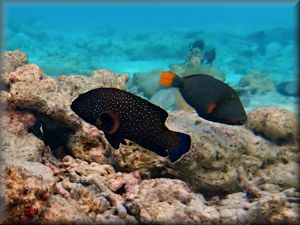How to Snorkel for Underwater Photography
Equalise your ears to avoid earache during a dive
equalising gets easier with practice - start equalising at the top of your dive before pressure builds
We've all felt ear pressure when descending in a plane.
While high up, pressure in our middle ear reduces to equal the low cabin pressure.
As the plane descends the cabin pressure increases, so temporarily, there is more pressure outside than inside the middle ear. The sooner it equalises the sooner the discomfort goes.
The same thing happens when we dive, because the water pressure increases as we descend.
As the plane descends the cabin pressure increases, so temporarily, there is more pressure outside than inside the middle ear. The sooner it equalises the sooner the discomfort goes.
The same thing happens when we dive, because the water pressure increases as we descend.

Your ears may feel uncomfortable when you are down less than two metres. It varies a bit.
Equalisation is better and easier to do as you descend BEFORE you feel any pressure.
There are a number of options. A few are:-
Equalisation is better and easier to do as you descend BEFORE you feel any pressure.
There are a number of options. A few are:-
- The Valsalva Manouvre (popular)
- The Frenzel Manouvre (probably the best)
- The Yawn & Swallow or Hands Free
The Valsalva manouvre simply involves
pinching your nose through your mask and then gently blowing through the mouth into your nose.
You should hear a small pop as each ear equalises, and you can go down another couple of metres. It becomes very quick and easy to do with practice. Repeat as necessary as descend.
Pluses
You should hear a small pop as each ear equalises, and you can go down another couple of metres. It becomes very quick and easy to do with practice. Repeat as necessary as descend.
Pluses
- very, very easy (so popular)
- can hurt ear if blow too hard
- harder to do as go below 5 - 10 metres
- lots of energy and oxygen used, which shortens the dive duration
The Frenzel Manouvre is more complex, involving a simultaneous, blocking and pumping action, involving the tongue and
soft palate.
It results in a small pop in each ear. It needs to be repeated as you descend every metre or two, as with the Valsalva.
Pluses
It results in a small pop in each ear. It needs to be repeated as you descend every metre or two, as with the Valsalva.
Pluses
- no blowing so can't damage the ear
- very little energy and oxygen used, so little shortening of the dive duration
- remains easy to do at moderate depths
- more complex to learn
- some elderly can need to practice it


Hands Free - some lucky people are born able to equalise by simply
wriggling their jaw from side to side or similar. Whatever works for you.
Don't try to go ignore the pressure.
If you can't equalise don't force it. The ear will hurt and will continue to hurt even when ashore. It may become inflamed.
Don't try to go ignore the pressure.
If you can't equalise don't force it. The ear will hurt and will continue to hurt even when ashore. It may become inflamed.
You will only be able dive shallower and shallower.
So, give up for that snorkel. Pootle around on the surface and avoid the ear ache.
Apparently not recommended for scuba divers.
Decongestants can reduce any sinus pressure or pain if taken well before the snorkel.
So, give up for that snorkel. Pootle around on the surface and avoid the ear ache.
Apparently not recommended for scuba divers.
Decongestants can reduce any sinus pressure or pain if taken well before the snorkel.


